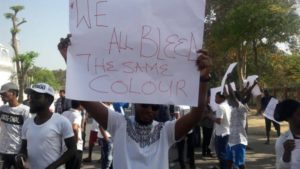Attacks in Greater Noida reveal societal prejudices

Students of various African students expressed their concerns over the attack at Greater Noida. Picture from Facebook, Association of African Students in India
After mobs unleashed violence on Nigerian students in northern India, officials look for redressal.
Nigerian officials have asked the Indian government for diligent prosecution of perpetrators of the recent attack on its nationals. Mobs turned violent in a residential area of Greater Noida in Delhi NCR, reacting to false rumours surrounding the death of a local youth. Denouncing the attacks, Nigeria has now sought protection of it citizens in the India, which is over 50,000 in number. Nigerians and other African nationals have been subject to racial profiling and subsequent violence in the past, stemming from characterising them as drug dealers, among other things. A country that perpetuates notions of beauty based on the colour of skin, India faces a challenge in dealing with its take on racism, which is becoming manifested in its treatment of foreign nationals.
After the federal government of Nigeria summoned the Indian high commissioner, Permanent Secretary, Ministry of Foreign Affairs, Olushola Enikanolaiye, at a meeting in Abuja, with Nagabushana Reddy, Indian high commissioner to Nigeria, stated, “It is a concern to us that Nigerian students in that place were harassed, beaten up and many of them were seriously injured. It is not the first time this has happened; Nigerians have suffered similar attacks in the past; so, what we will like to see on this occasion is that the perpetrator should be arrested.”
Even as Indian officials have been quick to respond on the issue, with Foreign Minister Sushma Swaraj assuring an investigation after a word with the Chief Minister of Uttar Pradesh, the situation remains tense. Security has been stepped up with reported increase in police presence. The Association of African Students in India (AASI), in response to the incident, has also expressed intent to lodge a formal complaint with the African Union (AU). Among the actions that the association as threatened to take upon failure to ensure security for African students by the Indian government, is urging the union to severe all bilateral trade with India.
After the death of a local youth, a residential area in Greater Noida erupted with rumours of Nigerian students being behind the death. Reportedly, speculations ranged from cannibalism to providing drugs to the youth, who was suspected to have died from an overdose, after which five Nigerians were arrested. They were later released due to lack of evidence for the crime of murder that was charged on them. Reports also suggest that the cause of the death of the local youth remains unknown. At a vigil that was undertaken later by residents, allegedly in protest of the release of the Nigerians, students from the African country were beaten up on the streets and CCTV footage from a shopping complex also recorded the violent outburst.
An Indian mob brutally attacked Nigerian students and the incident is causing the nation to address racism. pic.twitter.com/ENBbrt1rOt
— AJ+ (@ajplus) March 28, 2017
India and Nigeria have shared bilateral relations for over four decades now, and Nigeria has shared that India has become the largest crude oil importer from the country. Sharing historical ties through a shared colonial ruler, the British, and as partners in the Non-Alignment Movement, the countries are moving closer in economic and trade relations. Despite significant numbers of citizens of each country residing in the other, cultural ties between the countries have somewhat remained tense, with recent history showcasing India’s behaviour towards Nigerian citizens as racist. India also has an increasing interest in and are growing ties with other African nations. The recent Indo-African Summit that saw attendance of over 40 heads of state and governments at the national capital, New Delhi, also marked the growing relations, which is not reflected among the citizens.
Introspection is the call of the hour
In 2013, an incident in the southern Indian state of Goa led to a minister equating Nigerian citizens to ‘cancer’, even as he later retracted his statement. Numerous incidents have followed, with recent ones including the stripping and thrashing of a Tanzanian student in the IT capital of India, Bengaluru, in southern Indian state of Karnataka, last year. Even though India has been quick to condemn racist attacks offshore, the hypocrisy of its own society becomes evident when even leaders refuse to acknowledge its racist nature.
Whether advertisements encouraging fairness of skin as a marker of social status or historical equivalence through mythology and caste-based discrimination of ‘dark skin’, India finds itself in a schizoid condition over skin and race. Greater Noida District Magistrate, Nagendra Prasad Singh, responded to the event, highlighting this refusal to acknowledge the racist nature of crimes. “It is absolutely not a hate crime, nor is it some kind of anger against a race. A few people have spread rumours regarding the death of a youth, which gave rise to anger. The incident happened in continuity of that,” Singh said, adding, “We will not let the nation’s image get hampered.”
When an entire population is consistently subjected to gross generalisation and consequent prejudice, asked to ‘Go back to Africa’ for the crime of belonging to that continent, responses such as that by the District Magistrate are a reminder that introspection is a tall task to expect.









